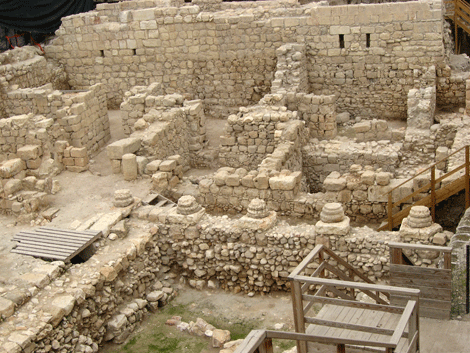[...] [D]uring a famine at Jerusalem she sent to Alexandria for [grain] and to Cyprus for dried figs for distribution among the sufferers from the famine. In the Talmud, however (Bava Batra 11a), this is laid to the credit of Monobaz [...]. The Talmud speaks also of important presents which the queen gave to the Temple at Jerusalem.She bore her brother two sons, and later in life moved to Jerusalem, where she built a small palace by the Temple, and was buried in a massive, sophisticated personal tomb.
Josephus tells us that Helena in her lifetime built three pyramids (which no longer exist) over the intended tomb. Pausanias [...] mentions a unique mechanism that opened the tomb automatically at certain times and sealed it at others:
They have contrived to make the door of the tomb, which is stone like all the rest of it, so that it opens only on a certain day of the year at a particular season: at that moment the machinery opens the door on its own, holds it open for a little while, and then closes it up again. At the time you can get in like that, but if you tried to open it at any other time it would never open -- you would have to break it down first.
 |
| Tomb complex of Queen Helena |
Her palace was destroyed when the Romans sacked Jerusalem and destroyed the Temple in vengeance for the Jewish Revolt.
 |
| Ruins of Queen Helena's Jerusalem palace |
On the very day that the king died, with Izates far away, Queen Helena called an assembly of noblemen, district governors, and army commanders in the royal palace at Arbela [modern Arbil]. [...] Then, she explained that Monobazus had chosen Izates to succeed him and had thought him worthy to do so. She appealed for their support. The fact that the queen summoned the council and had the honour of speaking first -- rather than her eldest son -- bolsters the idea that brother-sister royal incest increases the power and status of a queen [as recently discussed in my post on the incestuous Ptolemaic queen Arsinoë II].It also seems that, by the standards of the time for monarchs, they were extremely magnanimous.
[Helena's] next move was unexpected, perhaps even naive: she entrusted her eldest son, Monobazus, with the diadem and insignia of office until Izates could get to Arbela and begin his reign. Perhaps Helena knew something that cynics didn't know: Monobazus duly surrendered his temporary powers, and Izates was crowned king in 36 CE. Inspired by his religious scruples, we are told, Izates acted with a clemency extraordinary for the age: rather than kill [his half-brothers], he sent them away as hostages to Rome and Parthia.
 |
| Drawing of a Relief of King Izates |
For some time Izates enjoyed peace; and he was so highly respected that he was chosen as arbitrator between the Parthian king Artabanus III and his rebellious nobles. But when several of Izates' relatives openly acknowledged their conversion to Judaism, some of the nobles of Adiabene secretly induced Abia, an Arab king, to declare war against him. Izates defeated his enemy, who in despair committed suicide. The nobles then conspired with Vologases, King of Parthia, but the latter was at the last moment prevented from carrying out his plans, and Izates continued to reign undisturbed for twenty-four years.Helena died soon after him, and both were interred in Jerusalem.
 |
| Sarcophagus of Queen Helena |
The Talmud relates that [...] "[...] [h]is bothers and his father's household came in a delegation to him and said, 'Your father saved money and added to the treasures of his fathers, and you are squandering them.' He replied, '[...] My fathers gathered treasures of money and I have gathered treasures of souls...' King Monobaz also donated handsome gifts to the Temple in Jerusalem.
No comments:
Post a Comment